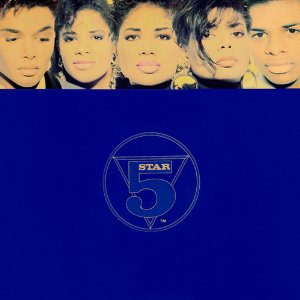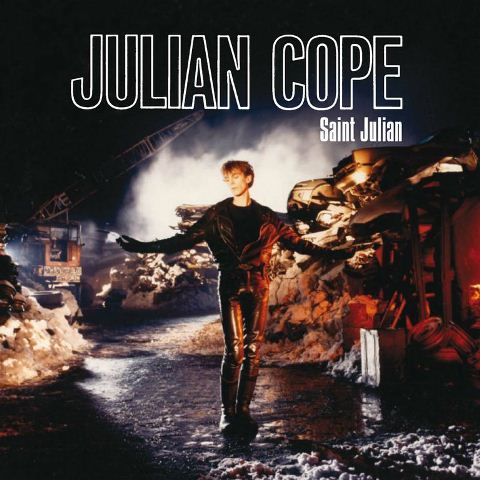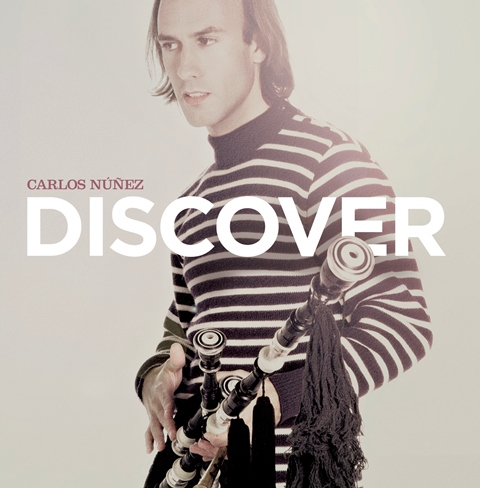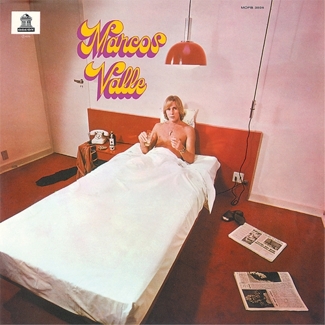Reissue CDs Weekly: Marcos Valle, Five Star, Julian Cope, Carlos Núñez | reviews, news & interviews
Reissue CDs Weekly: Marcos Valle, Five Star, Julian Cope, Carlos Núñez
Reissue CDs Weekly: Marcos Valle, Five Star, Julian Cope, Carlos Núñez
Brazilian treasure, Eighties popsters on the wane, a maverick goes mainstream and Spanish bagpipes
In 1968, having already done time in Sérgio Mendes & Brazil 66, Marcos Valle was selling bossa nova and samba to America, appearing on The Andy Williams Show in a blazer and roll neck. By the year’s end he was back in Brazil, which at the time was ruled by a fully-fledged dictatorship. Caetano Veloso and Gilberto Gil would go into exile but Valle wilfully chose the opposite path. His music and appearance changed: the former moving away from popular Brazilian styles and incorporating outside influences; the latter becoming more hirsute. His lyrics dug at the regime. These four early Seventies albums chart the flowering of the new Valle, a troubadour who had to mask his message.
His appeal has broadened after being sampled by Jay-Z (whose “Thank You” draws from Marcos Valle’s "Ele e Ela”), Kanye West, Pusha T and Madlib. With folks like that cocking an ear, you’d be forgiven for combing these four albums for beats, instantly hooky refrains and passages to build songs around. You could. But that would be to miss much of the appeal of these wonderful albums.
It’s also possible to miss the lyrical double meanings; the junta must have done to allow these records into the shops: on Previsão do Tempo’s “Samba Fatal” Valle sings (helpful English translations are included): “he awoke between the magic and the mystical, the practical and the political, the prophetic and the poetic… he pondered whether to die of fright.” The front cover of Marcos Valle pictures him in bed, drink in hand. On the reverse, the now-mussed bed is empty, women's underwear strewn alongside it. Such cheesiness was put in the shade by the two sides to his music.
There’s not a lot to separate Marcos Valle (1970) Garra (1971) Vento Sul (1972) and Previsão do Tempo (1973). His closest musical brother was Milton Naschimento, who also drew from The Beatles’ Paul McCartney side. Valle was also smitten with Stevie Wonder, whose gentle groove and synths become increasingly evident, especially on Previsão do Tempo. The first two albums have some weaker tracks composed for TV and film soundtracks. Vento Sul brings more rock into the mix for a seamless stew of gentle funk, proto-MPB and soaring prog-rock portmanteau song structures (“Bôdas De Sangue” comes over like an orchestrated, exotified Caravan). With good booklet essays and nice packaging, the full set is essential.
 Five Star: 5 Star/Shine
Five Star: 5 Star/Shine
The Nineties weren’t quite as glittering as the Eighties for Essex five-piece, dance-pop siblings Five Star. These two albums – 1990’s 5 Star (getting its first UK release) and 1991’s Shine – caught them on the downslide. Neither charted. Despite cleaning up with catchy, Jacksons-influenced songs and synchronised dance routines, some took against them. A live phone in on BBC children's show Going Live in 1989 motivated a caller to ask “why are they so fucking crap?” They had enough to deal with away from the public eye and were declared bankrupt that year. Stedman Pearson was arrested for public indecency in 1990. Their label elbowed them after Shine. Yet there’s nothing wrong with these albums. Each sounds of its time: glossy pop drawing from then-current trends, leaning heavily on programmed rhythms. Both CDs are supplemented by masses of remixes – with Shine, six versions of the title track. For 5 Star, these fill a second disc which includes 10 versions of “Treat me Like a Lady” (there was already one on Disc One, tacked onto the album). The Five Star magic is spread thin, but the strongest album cuts hold their own against the hits.
 Julian Cope: Saint Julian
Julian Cope: Saint Julian
Saint Julian was Julian Cope’s third solo album and his first for Island. With The Teardrop Explodes he had taken idiosyncrasy, obstinacy and psychedelia into the charts, but the solo rewards were mixed: the music was great, yet singles barely charted and the albums certainly didn’t. His final pre-Island album, Fried, was dark and fragmented. 1987's Saint Julian, however, was decisively focused and crammed with immediate, powerfully delivered songs. The past was never far away: “World Shut Your Mouth” borrowed its title from his first solo album; "Spacehopper" and “Screaming Secrets" were Teardrop Explodes cast-offs. Nonetheless, Saint Julian is a cohesive piece of work, and both album and singles charted. Disc Two on this "expanded edition" collates B-sides, 12-inch remixes (one by Trouble Funk) and tracks from EPs – though the interview from the cassette single of “World Shut Your Mouth" is not disinterred. If the pointless remixes are ignored this offers up an alternate Cope, the weird-beard of Fried bubbling away in the background. It's a pity, though, that no demos or live shows (his band then was his tightest) are included. The carelessness in not including annotation detailing the sources of the non-album tracks is balanced by a fine liner note from Ian Harrison. Saint Julian captures Cope embracing the trappings of rockist iconography and warping them with aplomb – something he would never do again with such clean lines.
 Carlos Núñez: Discover
Carlos Núñez: Discover
There’s no doubt that Galicia’s Carlos Núñez is a one-off. The only Spanish bagpiper to become internationally famous, he’s tirelessly made the case for his region’s Celtic heritage and is equally adept on virtually every woodwind instrument. After collaborating with The Chieftains it was a small step to work with The Waterboys’ Mike Scott. The double CD Discover dwells mostly on his collaborations with Scott, Ry Cooder, Ryuichi Sakamoto, Jackson Browne, Sharon Shannon, Sinéad O’Connor, Montserrat Caballé, The Chieftains, of course, and more. Overall, the musical world of Discover often isn’t far removed from Riverdance or James Galway, but the lilting silkiness is rent by the voice of Dulce Pontes and “Ocean of Sound”, made with Hector Zazou and Laurie Anderson. Núñez’s tendency towards the cloying needs such leavening.
Overleaf: watch Marcos Valle and Bossacucanova perform “Os Grilos” from the Marcos Valle album
The future of Arts Journalism
You can stop theartsdesk.com closing!
We urgently need financing to survive. Our fundraising drive has thus far raised £33,000 but we need to reach £100,000 or we will be forced to close. Please contribute here: https://gofund.me/c3f6033d
And if you can forward this information to anyone who might assist, we’d be grateful.

Subscribe to theartsdesk.com
Thank you for continuing to read our work on theartsdesk.com. For unlimited access to every article in its entirety, including our archive of more than 15,000 pieces, we're asking for £5 per month or £40 per year. We feel it's a very good deal, and hope you do too.
To take a subscription now simply click here.
And if you're looking for that extra gift for a friend or family member, why not treat them to a theartsdesk.com gift subscription?
more New music
 Album: Elton John and Brandi Carlile - Who Believes in Angels?
Elton John & Brandi Carlile step out in style
Album: Elton John and Brandi Carlile - Who Believes in Angels?
Elton John & Brandi Carlile step out in style
 Album: Erlend Apneseth - Song Over Støv
Norwegian musical impressionist’s journey into the centre of a vortex
Album: Erlend Apneseth - Song Over Støv
Norwegian musical impressionist’s journey into the centre of a vortex
 Music Reissues Weekly: Yeah Man, It's Bloody Heavy
The ne plus ultra of British heavy rock
Music Reissues Weekly: Yeah Man, It's Bloody Heavy
The ne plus ultra of British heavy rock
 Album: Bryan Ferry and Amelia Barratt - Loose Talk
A match made in urban nightlife and the mysteries of everyday living
Album: Bryan Ferry and Amelia Barratt - Loose Talk
A match made in urban nightlife and the mysteries of everyday living
 Album: Will Smith - Based on a True Story
Big Willie’s back - but maybe he should’ve stayed home
Album: Will Smith - Based on a True Story
Big Willie’s back - but maybe he should’ve stayed home
 Album: Perfume Genius - Glory
Album seven from an artist carving out his own space in the most modernist of ways
Album: Perfume Genius - Glory
Album seven from an artist carving out his own space in the most modernist of ways
 Album: Alison Krauss & Union Station - Arcadia
Their first album in 14 years looks hard at the past, and its role in the present
Album: Alison Krauss & Union Station - Arcadia
Their first album in 14 years looks hard at the past, and its role in the present
 Lauren Mayberry, Barrowland, Glasgow review - solo star stays too close to the day job
The Chvrches singer mixed some great tunes with an overly heavy sound.
Lauren Mayberry, Barrowland, Glasgow review - solo star stays too close to the day job
The Chvrches singer mixed some great tunes with an overly heavy sound.
 Album: Toria Wooff - Toria Wooff
Assured but too measured debut album from Americana-inclined singer-songwriter
Album: Toria Wooff - Toria Wooff
Assured but too measured debut album from Americana-inclined singer-songwriter
 Music Reissues Weekly: Too Far Out - Beat, Mod & R&B From 304 Holloway Road 1963-1966
Maverick producer Joe Meek’s maximum-impact approach to the beat-group scene
Music Reissues Weekly: Too Far Out - Beat, Mod & R&B From 304 Holloway Road 1963-1966
Maverick producer Joe Meek’s maximum-impact approach to the beat-group scene
 Album: Selena Gomez and Benny Blanco - I Said I Love You First
An album by a pair of loved-up Hollywood celebs that is, whisper it, rather good
Album: Selena Gomez and Benny Blanco - I Said I Love You First
An album by a pair of loved-up Hollywood celebs that is, whisper it, rather good
 Album: The Horrors - Night Life
A new line-up proves no hindrance to a band bringing electro-rock zip to the darkness
Album: The Horrors - Night Life
A new line-up proves no hindrance to a band bringing electro-rock zip to the darkness


Add comment